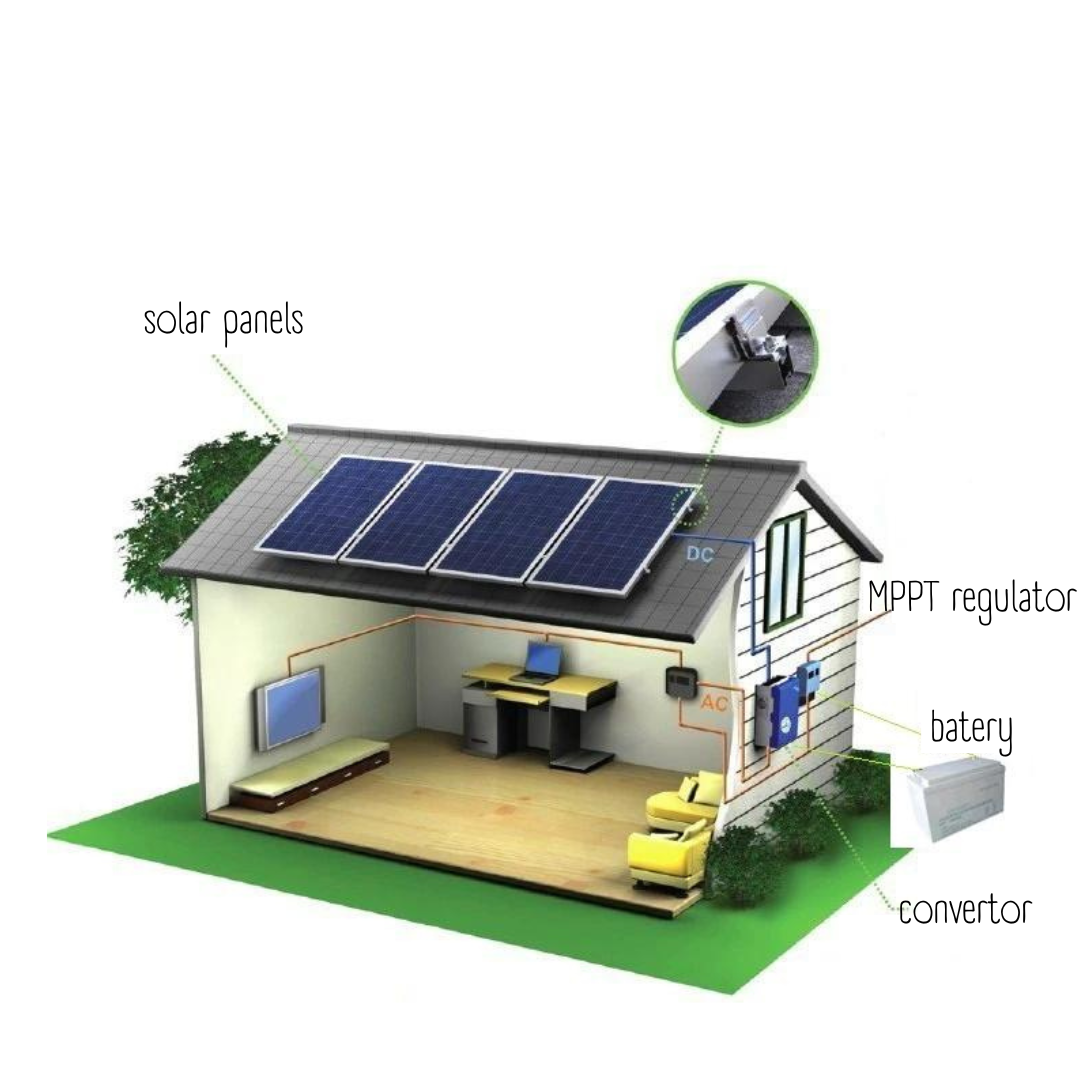How does an off-grid photovoltaic system work?
The electrical energy produced by the photovoltaic panels is either consumed immediately or stored in batteries for later use. The MPPT controller then ensures efficient control of battery charging. Only appliances that use direct current can be connected directly to the battery with separate protection, if you need to power common household appliances with alternating current of 230 V, it is necessary to add a voltage converter to the system.
Where can off-grid systems be used?
Off-grid photovoltaic power plants are used in places where the electrical grid is not available. Typically, these are places remote from civilization, where establishing an electrical connection would be financially too costly. At the same time, it can also be objects where an electrical connection would practically not be able to be installed (caravans, vans, etc.)
Of course, even people who want to be energy independent or are huge enthusiasts of renewable energy sources can purchase an off-grid photovoltaic system. This system will also help people who, even in a cottage outside of civilization, require certain home comforts, i.e. the ability to listen to the radio, watch TV, store food in the fridge and charge their computer.

Advantages of an off-grid photovoltaic system:
There are several advantages associated with using systems:
- Lower energy costs: Harnessing solar energy from a photovoltaic system can reduce reliance on traditional energy sources such as grid electricity or fossil fuel generators. This can lead to long-term reductions in energy costs.
- Environmental friendliness: Solar energy is a renewable resource that produces zero greenhouse gas emissions and does not cause air or water pollution during operation. Using photovoltaic systems can help reduce your carbon footprint and protect the environment.
- Ease of installation and maintenance: They are easy to install and require minimal maintenance once deployed. This means that owners have the ability to quickly and easily access electricity without having to wait for the extension of the distribution power grid.
- Flexibility and modularity: They are modular and can be easily expanded or modified according to the needs of the user. Owners can have additional photovoltaic panels or batteries added if they need to increase the performance of the system or increase its capacity.
- Emergency backup sources: Can serve as a backup power source in the event of a power outage. This aspect is particularly useful in areas where power outages are frequent.
- Independence from the electrical grid: Off-grid photovoltaic systems allow powering electrical devices outside the reach of the distribution electrical grid. This is very useful in remote areas where a stable network connection is not available.
Questions and answers
1. Are there subsidies for off-grid PV?
No, unfortunately, off-grid PV subsidies do not apply.
2. Does the off-grid system work over winter?
Off-grid photovoltaic systems are usually able to provide a reliable source of electricity even in winter conditions in the Czech Republic. Proper design, installation, and maintenance can ensure optimal system performance year-round, despite changes in weather and daylight.
In the case of ensuring reliable operation in hot climatic conditions, the system can be supplemented with another energy source, typically this is a gasoline central station or in a place with sufficient gusts of wind there is the possibility of a connected wind turbine.
3. Can I have a pure off-grid house?
Yes, the family house can only be powered by an off-grid photovoltaic system. When designing and installing an off-grid PV system, it is important to carefully assess the energy needs of the house and size the system to cover all electricity consumption. A properly installed and managed system can provide a reliable and sustainable source of electricity for a family home.
4. Is a battery needed for an off-grid system?
Yes, without the battery the system cannot work at all. It is used to store excess energy produced by photovoltaic panels during the day. This energy is stored for later use, for example when the sun is not shining. The batteries allow the PV system to operate even in adverse conditions, providing a reliable source of electricity for the home or devices that are powered by the off-grid system.
5. Can the set be expanded with more panels/larger controller/more batteries?
Yes, Victron Energy off-grid PV systems are very modular and can be easily expanded or modified according to the user's needs. We always design the system in such a way that even after some time, additional photovoltaic panels or batteries can be added if the user needs to increase the performance of the system or increase its capacity.
6. What is the lifespan of photovoltaic panels?
The lifetime of photovoltaic panels varies from manufacturer to manufacturer, but for example: the panels in our offer have a 12-year warranty on functionality and a 25-year warranty on linear power. However, many panels can last longer, although they may begin to lose efficiency as they age.
